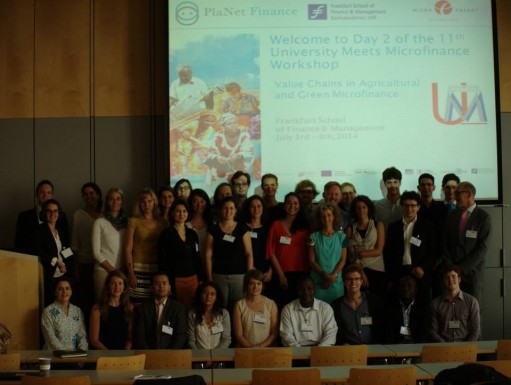“My experience in the Dominican Republic with Northeastern’s Social Enterprise Institute allowed me to interact with bottom of the pyramid microentrepreneurs and understand how their needs are being met by microfinance institutions.”
That was me about nine months ago, interviewing for a co-op position at PlaNet Finance in Paris. I was asked to explain why I thought I was the ideal candidate, and I immediately defaulted to SEI experiences as my trump card. Despite some stuttering French, it worked, and I was hired as the Assistant Project Officer on the University Meets Microfinance (UMM) team.
UMM is a European Union-funded initiative that fosters cooperation between universities, students in Europe, and microfinance practitioners. This is achieved through microfinance seminars held at European universities, bi-annual workshops bringing together practitioners, academics and students, scholarships aiming to empower students to pursue microfinance education and research-intensive case studies.
As a member of a small team in the Paris office, I benefited from a wide variety of diverse assignments. One week I was building the new project website, and another I was drafting narrative reports for our public donors. But my interests are more geared towards the developing world, so I sought out other opportunities to work on PlaNet Finance’s more international projects. As a result, I worked with the director of research on some extremely interesting publications, including a study on mobile banking in rural Morocco and another on expanding financial inclusion in India.
The highlight of my co-op was organizing a workshop on Value Chains in Agricultural and Green Microfinance at the Frankfurt School of Finance & Management. I worked with a scientific coordinator based in the Milan office to seek out potential speakers and ensure that the content of their presentations fit within the theme of the workshop. This exposed me to some of the leading European actors in this space, including Rabobank Foundation, Oikocredit, the International Labor Organization and MicroEnergy International. I learned a great deal from interacting directly with speakers from these organizations, especially about the different financing strategies impact investors use to assesses potential agricultural and microfinance investments. I had little exposure to impact investing before the workshop, but as a result of what I learned I was intrigued.
By a stroke of luck, one of the world’s largest impact investors, responsAbility Investments (backed by Credit Suisse), has its Paris office in the same building as PlaNet Finance. I successfully interviewed with them, and am happy to say I am returning to Paris in January for my final co-op as a Microfinance and Fair Trade Investment Analyst focusing on the Middle East. My long-term plan has always been to take what I have learned about social enterprise and apply it to my home country of Egypt, and this co-op will take me one step closer.
My SEI experiences were invaluable in not only helping me land my co-op at PlaNet Finance, but also in putting me in a position to benefit from it. In fact, the centerpiece of my shameless self-promotion during my responsAbility Investments interview was the ENTR 4506 capstone course and trip to Nicaragua, where we studied agricultural cooperatives and awarded a $10,000 grant to the most deserving one. As I prepare to leave Northeastern, I look back and realize that SEI was the defining element of my college career. I wouldn’t have had it any other way.



